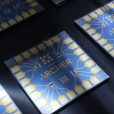Picture this: a quantum computing chip that works smoothly at room temperature. For those not in the know, a typical quantum chip requires sub-zero temperatures, such as -273 degrees. Materials technology company Archer Materials (ASX: AXE) has challenged that by using complementary metal–oxide–semiconductor (CMOS) chip technology to detect quantum information in the 12CQ qubit material at room temperature.
This represents a step-change advance in Archer’s 12CQ chip development as the Company detected quantum information in its qubit (a unit of quantum info) material at room temperature using CMOS technology. Now, Archer has shown that quantum information in the 12CQ qubit material can be found with the help of high electron mobility transistor (“HEMT”) technology, widely used in common tech, including that of mobile phones, and, finally, CMOS technology, which is used to make chips in the semiconductor industry.
Archer is the only ASX listed company and one of a few players in the world developing qubit processor technology. Archer CEO Dr Mohammad Choucair said, “The significance of the work to realise a CMOS chip that successfully detects the quantum spin states in our qubit material at room temperature cannot be understated and represents a stepchange technological achievement in advancing Archer’s 12CQ quantum chip development.”
According to him, a key advantage of the new chip is that it allows for scalability. After all, it is made with standard and commercially available semiconductor fabrication technology.
Know the firmware that powers your laptop? It is typically produced using CMOS technology. CMOS is a widely used semiconductor technology for building the chips found in most modern-day devices, like processors, memory and sensors. All things considered, CMOS tech is here to stay, which is what makes it all the more important to show the functional incorporation of the 12CQ qubit material with CMOS devices.
This new development is a major tech feat for the Company. The CMOS single-chip detectors were developed by Archer collaborators at EPFL (Ecole Polytechnique Federale de Lausanne) and manufactured by Taiwan Semiconductor Manufacturing Company. The detectors apply the most widely adopted semiconductor technology used to build chips found in most modern-day devices and allow for the implementation of complex qubit control required in quantum circuits. Moreover, they could sufficiently detect the electron spin state in a few picolitres (picolitre is a trillionth of a litre) of qubit material at room temperature.
“This achievement builds on the considerable progress Archer has made this year in the design and development of the 12CQ chip, which all link to the future operation of the technology,” notes Choucair.
All in all, integrating Archer’s 12CQ qubit material with CMOS technology provides a potential pathway for the development of practical quantum-enabled mobile devices. It could even make its use ubiquitous in the years to come. This can be super advantageous especially given the advantages of quantum computing for laymen. Research shows that it could protect your phone from potential data hacks and can even tackle global warming by speeding up the incorporation of green tech.
It would be interesting to see how the Company’s remarkable discovery plays out in its application and the possibilities that await it.
- Ovanti’s iSentric signs contracts worth $14.4m with Malaysian commercial bank - June 27, 2024
- Baby Bunting fights back from retail downturn with 5-year strategy, includes Gen-Z focus and self-funded growth - June 27, 2024
- CLEO meets with US FDA to develop strategy for ovarian cancer test launch - June 26, 2024













Leave a Comment
You must be logged in to post a comment.